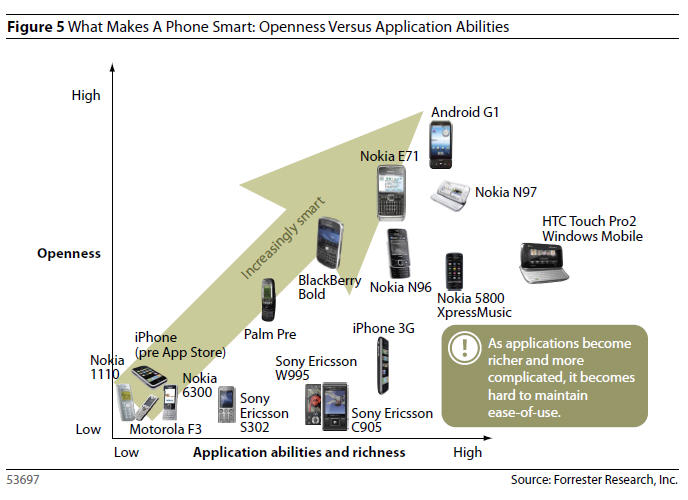Wither the 'smartphone': Reorganizing the mobile market when all devices get smart

Smartphones as a term is dying a quick death as all phones become smarter with Internet access, email and other capabilities. Meanwhile, the mobile market will be carved up based on whether devices are open, foster consumption or content creation, and utility and entertainment, according to Forrester Research. Simply put, the organizing principles around the mobile industry are about to get blown apart.
In a research report, Forrester analyst Ian Fogg slices the mobile market. Here's the Fogg's bottom line:
Apple’s and Google’s arrival in the mobile market is causing knock-on effects throughout the market and is opening up opportunities. All mobile handsets are becoming smarter and Internet-capable. Yesterday’s smart high-end phone is today’s midrange phone and tomorrow’s entry-level phone. The “smartphone” category is no longer useful as all phones become smart. Instead, we propose three new frameworks to segment the smart mobile device market: openness and extensibility; consumption and creation; utility and entertainment. All mobile strategies must adapt now: Consumer electronics makers must decide on their response to widely available smarter phones and the mobile Internet; handset makers must leverage software to play the mobile Internet game and differentiate long term; media, finance, retail, and other Internet companies’ strategies must exploit mobile opportunities now or lose ground to faster rivals. But the mobile market will remain fragmented with no single platform — no Windows PC equivalent — anytime soon on mobile devices.
That reality is what makes the mobile industry so much fun---it's a free for all.
The key points:
- So-called featurephones will encroach on the smartphone. Let's face it: All phones in a few years will be able to use Internet services, fetch email, have a camera, play music and use some sort of operating system. Fogg recommends that the terms featurephone and smartphone should go extinct. In addition, smartphones today are tomorrow's plain old mobile phone. Fogg has a few examples: The BlackBerry Pearl used to be smart, but is now used for prepaid plans. Nokia's Series 60 operating system used to be for high-end handsets, but those devices are marked down significantly today.
- Mobile phones will crush specialists. Phones have good enough features to ruin sales of video cameras, music players, handheld game consoles and GPS gadgets.
- Mobile devices will organize around major and minor features. For instance, the 3G iPhone has a weak camera, Amazon's Kindle stinks at music and the Sony PSP focuses on games, but has other features.
Forrester then takes a stab at some organizing principles. The mobile market will reorganize based on the following:
Applications extensibility and openness. Extensibility refers to the ability to add features and adapt after a device is sold. Openness allows developers to add innovation on top of core building blogs. Fogg notes that no device is completely open: Mobile players will pick and choose their spots. Google's Android is deemed most open for now.
Consumption and creation. Some devices will be known best for crating data or consuming it. For instance, the iPhone is clearly a consumption device designed to make it easy to watch video, browse the Web and play games. You won't be writing memos, shooting pictures and creating media on it. You're more likely to create content on the BlackBerry Bold than view it. On a Forrester chart, iPhone is deemed the most consumption friendly device with the Nokia N97 rated the highest on the creation scale. It should be noted that the Palm Pre has staked out the exact middle ground between creation and consumption in Forrester's view.
Utility and entertainment. Fogg writes:
Both operators and device makers think of the market in terms of business versus consumer and organize their staffing and portfolios accordingly. They’re both wrong. A better framework is utility versus entertainment (see Figure 8). Carrying multiple mobile devices is a chore, and virtually all individuals have a home and a work life, even in these gloomy economic times. Individuals want a degree of both sets of abilities: It’s like the difference between emotional intelligence and conventional measures like IQ. The trick is to understand the correct balance of utility and entertainment for each consumer segment.
Today there are few devices that are deemed pure entertainment, but the iPhone comes close.
What's it all mean? Fogg has a few interesting thoughts on the major mobile players. Among the most notable ones:
- Apple should stick with the software as the primary theme for the iPhone. The iPhone should incorporate software like iLife, iWork, Aperture and Final Cut to keep its mobile edge.
- HTC needs to diversify from Windows Mobile. HTC is branching out into Android devices, but it will have trouble competing with integrated device makers. The upshot: HTC will have to choose platforms.
- Samsung and LG need to play in software to be differentiated. The hardware game is one of attrition. Related: Fogg reckons that Palm needs to be acquired by a larger player. He didn't connect the dots, but I will. Samsung should buy Palm.
- Microsoft can still win in mobile, but remains in a holding pattern. Fogg said whatever comes after Windows Mobile 6.5 has to deliver a wow factor to compete with Android, iPhone and Symbian.
- Google needs to work hard to spur Android followers. The problem: Android's openness and versatility will fragment the platform. How will Google balance openness with fragmentation?
